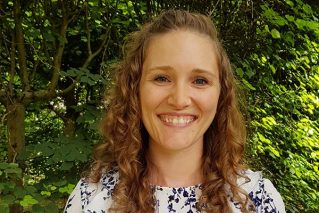Scientific discovery relies on information exchange, a significant portion of which occurs at face-to-face meetings. How should the scientific community adapt to the damage COVID-19 inflicted on this critical component on the information exchange supply line?

Intangibles of face-to-face meetings, relationship building, informal discussions, and opportunities to ideate and speculate will be difficult to supplant. Yet it may be feasible to streamline information exchange or have the information exchange aspect of the meetings be handled through electronic meetings. This would enable limited meeting time to focus on knowledge exchange and more formalized discussions.
Shifting the information exchange to electronic format would require a number of transformations by both the scientific communities and professional societies. The scientific community would need to be trained on how to prepare strong electronic presentations along with potential challenges associated with electronic presentations: obtaining permissions regarding intellectual property from other sources, loss of control of information that is presented, loss of informal peer review during face-to-face presentations, and consequences for future publications.
Professional societies would need to address quality control procedures for transmission and technical quality of the electronic presentations, how to address pre-publication concerns, potential loss of revenue, and the impact of non-member access to the presentations.
For ACS this would require setting up programs which account for continual turnover of community leadership, to train technical divisions and local sections on best practices for electronic meetings. Additionally, it may be time for ACS to re-address decisions made on recording of meeting content. - Michael Morello, Retired R&D Director Analytical Sciences: Volatile Flavor Analysis/Global R&D Fellow, PepsiCo

I don’t think the question is so much of “how should…” but “how has the scientific community adapted. We have seen an explosion of online collaboration that is unprecedented, leading some to wonder if COVID-19 will break the Internet! I think, however, that while this collaboration is necessary for keeping science going during the crisis, it is not sufficient to maintain science growth in the long term. The community will continue to use every tool in the toolbox to keep communication lines open: GoToMeeting, Skype, Zoom, Google Hangouts/Meet, Teams, and all of the other platforms to keep information flowing. However, these tools are a mediocre substitute for being able to talk with colleagues or meet a prospective client you hear complaining about a safety concern.
None of us know what “normal” will look like in the post-COVID-19 world, but we must plan now to recover “normal” with the understanding that the definition of normal may be different that what we had on 1 January 2020! We will all have to be flexible to what “normal” will be. - Harry Elston, Midwest Chemical Safety, LLC

I think 'Zoom' meetings, or something similar will occur more often, but I don't think they will take the place of face to face meetings. After things open up (not sure when that will happen) , I believe national meetings will be smaller for a while perhaps people will be more comfortable with smaller focused meetings for a while rather than large national meetings - psychology of the change are hard to predict... 9/11 changed things a lot. - John Pochan, Principal and Co-Founder at Avount Group, LLC

Face-to-face meetings are important to advance science. The scientific community is adapting through the use of virtual meetings and webinars to exchange information and advance science. Beyond the COVID-19 pandemic, the scientific community will have opportunities to employ a hybrid meeting approach utilizing the best strengths of face-to-face and virtual meetings. - Mike Appell, Research Chemist, USDA National Center for Agricultural Utilization Research

This period has definitely challenged the online resources for information sharing to expand, or at least our willingness to use them more. It is usually nicer to exchange information face to face but we can clearly do it through virtual face to face forums and we need to do so. - Amber S. Hinkle, Vice President, Plant Manager PET Channelview & PO JV NAFTA Operations, Covestro LLC

The question states something as fact that is actually supposition. I am not certain the data supports that discovery requires face-to-face interactions. Equipment today is better than ever for face-to-face exchanges when miles apart. Real face-to-face and computer face-to-face are pretty close for technical and business interactions. We’ve used collaboration tools in industry for a long time. Global teams are common and discovery seems to be doing fine. Data from academics also point to face-to-face being more optional than required. Sabbaticals wouldn’t exist if face-to-face meetings are necessary for scientific discovery. Sabbaticals would evoke such a catastrophic fall-off in productivity that no academic group could sustain itself. No professor would ever take a sabbatical if face-to-face interactions were necessary for success.
Face-to-face meetings are important to the ACS. One of the strengths of the ACS is its convening power and National Meetings are the biggest manifestation. Coronavirus inspired rejiggering of expectations around meetings imperils future conferences. I think we are demonstrating that the exchange of information is possible without sitting in a conference room listening to a live speaker. I am guessing that we will see more variation in the future. Speakers unable to attend giving remote talks will likely be the start. Whether we progress to fully virtual meetings remains to be seen. It is inevitable that we question the old paradigm.
Things will be lost if meetings, like the ACS National Meetings, go away. Interpersonal relationships are sustained with technology, but hard to create remotely. Virtual wine tastings are now a real thing, thanks to the pandemic. Virtual group dinners and receptions not so much. Social interactions don’t yet fully translate to the virtual world. It is unclear whether what is lost will be compensated by what is gained. There will be gains. No plane travel is a gain. No hotel stays is a gain. Back-to-back sessions that are miles apart won’t be a problem. That is a gain. - Mark Jones, The Dow Chemical Company

Scientists are smart and they can adapt to different modes of information exchange. Even before Covid-19, telephones and emails have been used extensively. With the easy availability of virtual meetings and social media, we can partly make up for the loss of face-to-face meetings. Of course, there is really no replacement for in-person meetings for some interactions. Perhaps we just have to increase our social distance when we talk in the future. - H. N. Cheng, Research Chemist, USDA Southern Regional Research Center

Networking and face-to-face communication is critical to developing a true understanding and background for many scientific discoveries and improvements. The virtual meetings and webinars have a limited ability to generate feedback from the participants.
By submitting questions, only selected issues are addressed and the interaction of differing views is limited. Often in a live scientific lecture (or any lecture), the questions from the audience and follow-up questions and ideas that are stimulated can be very valuable in truly understanding a problem.
From my own experience, I know that a face-to-face discussion has led to getting background knowledge on methodology and techniques that are not always given in the main lecture or literature. Hearing from the scientist about the trials that did not work or the circumstances by which a problem was solved is often critical to understanding the scope and limitation of that approach. More virtual scientific meetings and lectures are likely and these will be beneficial to everyone globally. The key will be to have a proper balance that allows large and small groups (communities) to maintain a personal and professional interaction. The balance will come as we continue to adapt to new technologies (not only in traditional chemical sciences but in the social and artificial intelligence sciences). - Rodney Bennett, Winding Trails, LLC


It seems to be a dogma that wars generate innovations. This war against this virus appears not different: We’re seeing a rapid exchange of scientific information related to the virus, treatments, and vaccinations. Evaluating the key mechanisms for sharing that information, vetting and curating it, and also successful remote brainstorming techniques are providing other mechanisms for information exchange. Peer review continues to be a key component in scientific advancement.
A recent article in C&EN described fast-track proposal reviews for computational chemistry projects. Within our company, we have multiple examples of protective materials that have been developed with partners within 1 month, and these materials are already in use in hospitals and with first responders. We are sure that other work-process improvements have been demonstrated in the past 3 months across the scientific community that will accelerate discovery and innovation. - Carolyn Ribes, Business Analytical Leader, The Dow Chemical Company and Al Ribes, Human Resources Global Metrics Lead, The Dow Chemical Company
The opinions expressed in this article are the author's own and do not necessarily reflect the view of their employer or the American Chemical Society.
Copyright 2022 American Chemical Society (All Rights Reserved)









